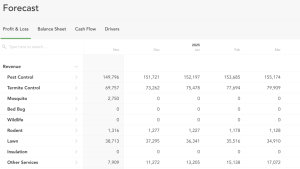How To Find A Small Business Accountant
Navigating the financial landscape of a small business can be a daunting task. It requires a deep understanding of bookkeeping, tax planning, and financial analysis.
This is where a small business accountant comes in. They can provide the financial clarity needed to make informed decisions.
But how do you find the right accountant for your business? This guide will provide actionable advice on selecting the right professional accounting service.
Whether you’re a small business owner, a startup founder, or a service provider, this guide is for you. It will help you understand the unique financial management needs of your business.
By the end of this guide, you’ll have a clear roadmap on how to find a small business accountant. You’ll also understand how they can help streamline your financial processes, save time and money, and enhance strategic decision-making.
Let’s dive in and start your journey towards better financial management.
Understanding the Role of a Small Business Accountant
A small business accountant plays a vital role in maintaining your business’s financial health. They handle bookkeeping, ensuring that records are accurate and up-to-date.
Beyond basic bookkeeping, accountants offer financial analysis. They help you understand where your money is going and how to optimize your spending.
Tax preparation and planning are also essential functions. A small business accountant ensures you comply with tax laws while identifying potential savings.
Ultimately, an accountant acts as a strategic financial partner. They provide insights and guidance that support business growth and profitability.
The Benefits of Hiring a Professional Accounting Service
Professional accounting services can save you both time and money. They allow you to focus on core business tasks rather than spending hours on financial paperwork.
These services offer expert insights that drive better decisions. Accountants provide valuable information that can guide your strategy and planning.
Additionally, a professional service ensures compliance with regulations. They keep your business in line with financial laws, reducing risk and penalties.
Finally, accountants can identify cost-saving opportunities. By analyzing your financial data, they find ways to increase efficiency and improve profitability.
Criteria for Choosing the Right Small Business Accountant
Choosing the right small business accountant involves several key considerations. Each factor plays a crucial role in finding the best fit for your needs.
First, evaluate their industry experience. Accountants with relevant experience understand your business challenges better.
Verify their communication skills. Clear, regular communication is essential for addressing your financial concerns.
It’s also important to consider their approach to problem-solving. Are they proactive in offering solutions and insights?
Finally, evaluate their technological proficiency. The right accountant should be adept at using modern accounting software.
Here’s a checklist to simplify your selection process:
- Industry-specific experience
- Relevant certifications and licenses
- Excellent communication skills
- Proactive problem-solving approach
- Technological proficiency with accounting tools
By considering these criteria, you can select an accountant who aligns with your business goals and needs.
The Importance of Industry-Specific Experience
Selecting an accountant with industry-specific experience is crucial. They understand the nuances and challenges unique to your field.
A knowledgeable accountant can offer tailored advice. This includes insights into sector-specific tax laws and financial practices that can benefit your business.
Industry experience means they can better anticipate financial challenges. This proactive approach helps in crafting strategies that drive growth and sustainability.
Their expertise in dealing with similar businesses provides an advantage. It ensures that your financial decisions are informed by best practices and industry norms.
Evaluating Credentials: Accountants vs. CPAs
Understanding the distinction between accountants and CPAs is vital. Accountants can handle general financial tasks, but CPAs have more rigorous training and certification.
CPAs must pass a comprehensive exam and meet experience requirements. This often means they can offer more specialized services, such as audits and advanced tax planning.
While both professionals handle bookkeeping and taxes, a CPA brings additional expertise. This can be particularly useful for complex financial situations or strategic planning.
Choosing between an accountant and a CPA depends on your business’s needs. Consider the complexity of your financial operations when making this decision.
How to Vet Potential Small Business Accountants
Selecting the right small business accountant requires careful vetting. This helps ensure compatibility and competence.
Begin by seeking referrals from trusted colleagues or networks. Personal recommendations often provide reliable insights.
Online reviews can also be valuable. Look for patterns in client feedback to gauge reliability and service quality.
Here’s a quick checklist for vetting accountants:
- Verify professional credentials and certifications.
- Inquire about experience with businesses in your industry.
- Discuss their communication style and availability.
- Request client references and follow up on them.
Take time to assess if their approach aligns with your business goals. The right accountant can drive financial success and stability.
Understanding the Fee Structure and Services Offered
Knowing what you’re paying for is crucial when hiring an accountant. Different services come with varying costs.
Accountants may charge hourly rates or flat fees. It’s essential to understand which pricing model suits your needs best.
Request a detailed list of services included in the fee. This ensures no surprise charges later on.
Discuss any additional services that might incur extra costs. Transparency in billing helps avoid misunderstandings.
Analyzing the fee structure helps align financial expectations. It also ensures the services provided meet your specific business needs.

Preparing for the Initial Consultation
The initial consultation is a pivotal step in hiring an accountant. It sets the stage for your professional relationship.
Begin by gathering all relevant financial documents. This might include recent financial statements and tax returns.
Have a list of questions ready. Focus on their experience, services, and how they can help your specific business.
Discuss your business goals and challenges. This helps the accountant understand your needs and tailor their services accordingly.
By being prepared, you ensure a productive meeting. This paves the way for selecting the best small business accountant for you.
Conclusion: Making the Right Choice for Your Business
Selecting the right small business accountant is crucial. It impacts your company’s financial health and growth. Take the time to evaluate your options carefully.
Remember to prioritize industry-specific experience and the right credentials. This ensures tailored services that align with your unique business needs.
The right accountant becomes a trusted partner. They offer insights that lead to better decision-making and financial management. This partnership can propel your business forward, ensuring a prosperous future.


